By Russell A. Berman · Monday, September 19, 2011 Telos 156 (Fall 2011) is now available for purchase here.
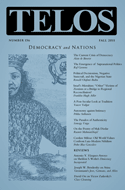 Will Europe be able to master its debt crisis and prevent the spread of economic instability throughout the eurozone? Will the political leadership in the United States be able to manage the challenge of the debt limit and, more broadly, the ongoing problems with the federal budget? As this issue of Telos goes to press, each of these dramas is still playing out, and the conclusion to neither is predictable. Will the euro crumble, will Washington grind to a halt? Probably not. Yet if Europe’s contagion is ultimately contained, and if the United States dodges the bullet and avoids default, it will only have been in the nick of time. Perhaps some tired observers will heave a sigh of relief and reassure themselves that the system has worked. Of course, escaping catastrophe is better than the alternative, and no one should be wishing for the worst. But this is not a matter of wishful thinking at all. Magic will not save us. On the contrary, this is about contemporary politics and the apparent inability of existing political institutions to address vital matters in an effective manner. Will Europe be able to master its debt crisis and prevent the spread of economic instability throughout the eurozone? Will the political leadership in the United States be able to manage the challenge of the debt limit and, more broadly, the ongoing problems with the federal budget? As this issue of Telos goes to press, each of these dramas is still playing out, and the conclusion to neither is predictable. Will the euro crumble, will Washington grind to a halt? Probably not. Yet if Europe’s contagion is ultimately contained, and if the United States dodges the bullet and avoids default, it will only have been in the nick of time. Perhaps some tired observers will heave a sigh of relief and reassure themselves that the system has worked. Of course, escaping catastrophe is better than the alternative, and no one should be wishing for the worst. But this is not a matter of wishful thinking at all. Magic will not save us. On the contrary, this is about contemporary politics and the apparent inability of existing political institutions to address vital matters in an effective manner.
Continue reading →
By Russell A. Berman · Monday, June 13, 2011 Telos 155 (Summer 2011) is now available for purchase here.
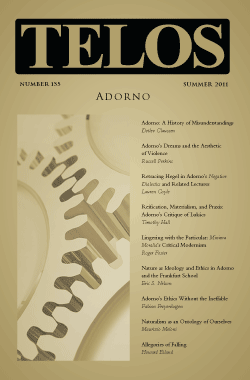 In the autumn of 1962, the philosopher Theodor Adorno, whose work is the topic of this special issue, wrote bluntly: “It would be advisable . . . to think of progress in the crudest, most basic terms: that no one should go hungry anymore, that there should be no more torture, no more Auschwitz. Only then will the idea of progress be free from lies. It is not a progress of consciousness.” The invitation to crudeness may seem surprising, coming from Adorno, still misrepresented as the pessimistic aesthete, consistently hostile to engaged activism, mass culture, and representational art. Such are the standard stereotypes. Yet here that same Adorno tries to reclaim a radical understanding of progress, the fulfillment of material needs and an empirical alleviation of suffering. Progress diminishes bodily pain; it is not—his rejection of Hegelian idealism is explicit—”a progress of consciousness.” In the autumn of 1962, the philosopher Theodor Adorno, whose work is the topic of this special issue, wrote bluntly: “It would be advisable . . . to think of progress in the crudest, most basic terms: that no one should go hungry anymore, that there should be no more torture, no more Auschwitz. Only then will the idea of progress be free from lies. It is not a progress of consciousness.” The invitation to crudeness may seem surprising, coming from Adorno, still misrepresented as the pessimistic aesthete, consistently hostile to engaged activism, mass culture, and representational art. Such are the standard stereotypes. Yet here that same Adorno tries to reclaim a radical understanding of progress, the fulfillment of material needs and an empirical alleviation of suffering. Progress diminishes bodily pain; it is not—his rejection of Hegelian idealism is explicit—”a progress of consciousness.”
Continue reading →
By Russell A. Berman · Monday, September 13, 2010 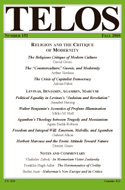 Enlightenment and modernity, the social formation with which it has been inextricably entwined, have had a complicated relationship with religion. Of course there have been important moments of genuine compatibility, when trust in reason converged with trust in God. A deist imagination animated the philosophers of the eighteenth century, including the leading figures of the American Revolution, who did not shy away from declaring that our inalienable rights derived from a Creator who had endowed us with them. The revolutionary act displaced the divine right of kings with the divine rights of all, and Thomas Jefferson could conclude that bold statement with “a firm reliance on the protection of Divine Providence.” While such modern thinkers valued faith, we can easily identify faithful believers who were simultaneously at home in the tradition of reason: Aquinas, Maimonides, and Avicenna, or more recently, Benedict XVI, consistently claiming that faith and reason belong together. Enlightenment and modernity, the social formation with which it has been inextricably entwined, have had a complicated relationship with religion. Of course there have been important moments of genuine compatibility, when trust in reason converged with trust in God. A deist imagination animated the philosophers of the eighteenth century, including the leading figures of the American Revolution, who did not shy away from declaring that our inalienable rights derived from a Creator who had endowed us with them. The revolutionary act displaced the divine right of kings with the divine rights of all, and Thomas Jefferson could conclude that bold statement with “a firm reliance on the protection of Divine Providence.” While such modern thinkers valued faith, we can easily identify faithful believers who were simultaneously at home in the tradition of reason: Aquinas, Maimonides, and Avicenna, or more recently, Benedict XVI, consistently claiming that faith and reason belong together.
Continue reading →
By Russell A. Berman · Tuesday, April 6, 2010 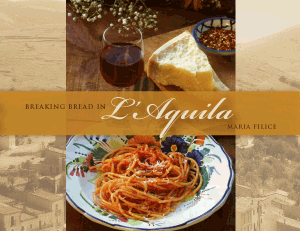 The founder and long-time editor of Telos, Paul Piccone, was born in Italy on January 17, 1940, in the city of L’Aquila, the capital of the Abruzzo. He combined philosophical passion with an irrepressible instinct for hospitality, and this was nowhere clearer than in the way he would generously gather friends and strangers together for meals that celebrated both food and thought. His culinary skills, of which he was legitimately proud, were only enhanced when he married Marie Filice, an accomplished chef in her own right. Since Paul—ever the traditionalist—and Marie made many trips to L’Aquila, the menu in their New York home was constantly renewed through those returns to the ancestral source. That profound connection to the past provided the foundation for the welcoming hospitality, where a set table was always a celebration. The founder and long-time editor of Telos, Paul Piccone, was born in Italy on January 17, 1940, in the city of L’Aquila, the capital of the Abruzzo. He combined philosophical passion with an irrepressible instinct for hospitality, and this was nowhere clearer than in the way he would generously gather friends and strangers together for meals that celebrated both food and thought. His culinary skills, of which he was legitimately proud, were only enhanced when he married Marie Filice, an accomplished chef in her own right. Since Paul—ever the traditionalist—and Marie made many trips to L’Aquila, the menu in their New York home was constantly renewed through those returns to the ancestral source. That profound connection to the past provided the foundation for the welcoming hospitality, where a set table was always a celebration.
Continue reading →
By Russell A. Berman · Monday, March 15, 2010 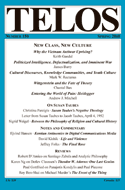 The paradigm of a “new class” originated in socialist Eastern Europe among dissidents and other regime critics as a way to describe the ensconced stratum of managers, technocrats, and ideologues who controlled the levers of power. The rhetorical irony of the phrase depended on the implied contrast with an “old class” as well as the good old class theory of the orthodox Marxism that once served as the established dogma of half the world. The history of class struggle, which had been history altogether, had culminated in the victory of a proletarian class that in turn had ushered in—or was well on its way to ushering in—a classless society. Or so the grand narrative went. To talk of a “new class,” then, conjured up the unquestionable epistemology of class analysis, while simultaneously challenging the notional outcome: instead of the end of the state and classlessness, one was stuck with police states and a new class that, while eminently cooler than the Bolsheviks of yore, still exercised a dictatorship (of the not-proletariat) while skimming off the benefits of unequal power. The phrase turned Marxism against Marxism during those decades when the fall of the Berlin Wall was not even imaginable. The paradigm of a “new class” originated in socialist Eastern Europe among dissidents and other regime critics as a way to describe the ensconced stratum of managers, technocrats, and ideologues who controlled the levers of power. The rhetorical irony of the phrase depended on the implied contrast with an “old class” as well as the good old class theory of the orthodox Marxism that once served as the established dogma of half the world. The history of class struggle, which had been history altogether, had culminated in the victory of a proletarian class that in turn had ushered in—or was well on its way to ushering in—a classless society. Or so the grand narrative went. To talk of a “new class,” then, conjured up the unquestionable epistemology of class analysis, while simultaneously challenging the notional outcome: instead of the end of the state and classlessness, one was stuck with police states and a new class that, while eminently cooler than the Bolsheviks of yore, still exercised a dictatorship (of the not-proletariat) while skimming off the benefits of unequal power. The phrase turned Marxism against Marxism during those decades when the fall of the Berlin Wall was not even imaginable.
Continue reading →
By Russell A. Berman · Wednesday, September 16, 2009 When asked whether the U.S. government considers Mahmoud Ahmadinejad to be the “legitimate president” of Iran, White House spokesman Robert Gibbs responded laconically that “he’s the elected leader,” according to an AP report of August 4. The phrasing—and the omission of any reference to the brutal suppression of Iranian protests—offers an insight into key political orientations of the current regime. What counts is the outcome, not the process; what matters are the ends, not the means; and what is of greatest importance is the state and its apparatus, not society and its complexities. No doubt, the Obama administration’s caution on this matter reflects its effort to emphasize diplomacy, as the opportunity for states to talk with states, and to back off from the democratization agenda of its predecessor. The way it has taken sides in Iran is, at least, consistent with its values. Diplomatic negotiations take place over the heads or behind the backs of society, which is why state departments and foreign ministries frequently find themselves at odds with the values of the polities they purport to represent.
This priority of state-to-state relations internationally corresponds domestically to the priority of the state over society. None of the expansion of policing powers of the previous era has been significantly retracted, while the management of the economy proceeds at a brisk pace, with the prospect of a biopolitical administration increasingly likely. Current events are breathing new life into Critical Theory’s nightmare of a “totally administered society.” Anxiety about the growth of the managerial state defined classical Critical Theory, and this was frequently enough one of the key issues that separated it from the orthodox left. For Telos, the political developments of the last third of the twentieth century seemed to indicate various rollbacks in the state apparatus and the potential emancipation of society. Has that historical episode come to an end?
Continue reading →
|
|
 Will Europe be able to master its debt crisis and prevent the spread of economic instability throughout the eurozone? Will the political leadership in the United States be able to manage the challenge of the debt limit and, more broadly, the ongoing problems with the federal budget? As this issue of Telos goes to press, each of these dramas is still playing out, and the conclusion to neither is predictable. Will the euro crumble, will Washington grind to a halt? Probably not. Yet if Europe’s contagion is ultimately contained, and if the United States dodges the bullet and avoids default, it will only have been in the nick of time. Perhaps some tired observers will heave a sigh of relief and reassure themselves that the system has worked. Of course, escaping catastrophe is better than the alternative, and no one should be wishing for the worst. But this is not a matter of wishful thinking at all. Magic will not save us. On the contrary, this is about contemporary politics and the apparent inability of existing political institutions to address vital matters in an effective manner.
Will Europe be able to master its debt crisis and prevent the spread of economic instability throughout the eurozone? Will the political leadership in the United States be able to manage the challenge of the debt limit and, more broadly, the ongoing problems with the federal budget? As this issue of Telos goes to press, each of these dramas is still playing out, and the conclusion to neither is predictable. Will the euro crumble, will Washington grind to a halt? Probably not. Yet if Europe’s contagion is ultimately contained, and if the United States dodges the bullet and avoids default, it will only have been in the nick of time. Perhaps some tired observers will heave a sigh of relief and reassure themselves that the system has worked. Of course, escaping catastrophe is better than the alternative, and no one should be wishing for the worst. But this is not a matter of wishful thinking at all. Magic will not save us. On the contrary, this is about contemporary politics and the apparent inability of existing political institutions to address vital matters in an effective manner.  In the autumn of 1962, the philosopher Theodor Adorno, whose work is the topic of this special issue, wrote bluntly: “It would be advisable . . . to think of progress in the crudest, most basic terms: that no one should go hungry anymore, that there should be no more torture, no more Auschwitz. Only then will the idea of progress be free from lies. It is not a progress of consciousness.” The invitation to crudeness may seem surprising, coming from Adorno, still misrepresented as the pessimistic aesthete, consistently hostile to engaged activism, mass culture, and representational art. Such are the standard stereotypes. Yet here that same Adorno tries to reclaim a radical understanding of progress, the fulfillment of material needs and an empirical alleviation of suffering. Progress diminishes bodily pain; it is not—his rejection of Hegelian idealism is explicit—”a progress of consciousness.”
In the autumn of 1962, the philosopher Theodor Adorno, whose work is the topic of this special issue, wrote bluntly: “It would be advisable . . . to think of progress in the crudest, most basic terms: that no one should go hungry anymore, that there should be no more torture, no more Auschwitz. Only then will the idea of progress be free from lies. It is not a progress of consciousness.” The invitation to crudeness may seem surprising, coming from Adorno, still misrepresented as the pessimistic aesthete, consistently hostile to engaged activism, mass culture, and representational art. Such are the standard stereotypes. Yet here that same Adorno tries to reclaim a radical understanding of progress, the fulfillment of material needs and an empirical alleviation of suffering. Progress diminishes bodily pain; it is not—his rejection of Hegelian idealism is explicit—”a progress of consciousness.”  Enlightenment and modernity, the social formation with which it has been inextricably entwined, have had a complicated relationship with religion. Of course there have been important moments of genuine compatibility, when trust in reason converged with trust in God. A deist imagination animated the philosophers of the eighteenth century, including the leading figures of the American Revolution, who did not shy away from declaring that our inalienable rights derived from a Creator who had endowed us with them. The revolutionary act displaced the divine right of kings with the divine rights of all, and Thomas Jefferson could conclude that bold statement with “a firm reliance on the protection of Divine Providence.” While such modern thinkers valued faith, we can easily identify faithful believers who were simultaneously at home in the tradition of reason: Aquinas, Maimonides, and Avicenna, or more recently, Benedict XVI, consistently claiming that faith and reason belong together.
Enlightenment and modernity, the social formation with which it has been inextricably entwined, have had a complicated relationship with religion. Of course there have been important moments of genuine compatibility, when trust in reason converged with trust in God. A deist imagination animated the philosophers of the eighteenth century, including the leading figures of the American Revolution, who did not shy away from declaring that our inalienable rights derived from a Creator who had endowed us with them. The revolutionary act displaced the divine right of kings with the divine rights of all, and Thomas Jefferson could conclude that bold statement with “a firm reliance on the protection of Divine Providence.” While such modern thinkers valued faith, we can easily identify faithful believers who were simultaneously at home in the tradition of reason: Aquinas, Maimonides, and Avicenna, or more recently, Benedict XVI, consistently claiming that faith and reason belong together.  The founder and long-time editor of Telos, Paul Piccone, was born in Italy on January 17, 1940, in the city of L’Aquila, the capital of the Abruzzo. He combined philosophical passion with an irrepressible instinct for hospitality, and this was nowhere clearer than in the way he would generously gather friends and strangers together for meals that celebrated both food and thought. His culinary skills, of which he was legitimately proud, were only enhanced when he married Marie Filice, an accomplished chef in her own right. Since Paul—ever the traditionalist—and Marie made many trips to L’Aquila, the menu in their New York home was constantly renewed through those returns to the ancestral source. That profound connection to the past provided the foundation for the welcoming hospitality, where a set table was always a celebration.
The founder and long-time editor of Telos, Paul Piccone, was born in Italy on January 17, 1940, in the city of L’Aquila, the capital of the Abruzzo. He combined philosophical passion with an irrepressible instinct for hospitality, and this was nowhere clearer than in the way he would generously gather friends and strangers together for meals that celebrated both food and thought. His culinary skills, of which he was legitimately proud, were only enhanced when he married Marie Filice, an accomplished chef in her own right. Since Paul—ever the traditionalist—and Marie made many trips to L’Aquila, the menu in their New York home was constantly renewed through those returns to the ancestral source. That profound connection to the past provided the foundation for the welcoming hospitality, where a set table was always a celebration.  The paradigm of a “new class” originated in socialist Eastern Europe among dissidents and other regime critics as a way to describe the ensconced stratum of managers, technocrats, and ideologues who controlled the levers of power. The rhetorical irony of the phrase depended on the implied contrast with an “old class” as well as the good old class theory of the orthodox Marxism that once served as the established dogma of half the world. The history of class struggle, which had been history altogether, had culminated in the victory of a proletarian class that in turn had ushered in—or was well on its way to ushering in—a classless society. Or so the grand narrative went. To talk of a “new class,” then, conjured up the unquestionable epistemology of class analysis, while simultaneously challenging the notional outcome: instead of the end of the state and classlessness, one was stuck with police states and a new class that, while eminently cooler than the Bolsheviks of yore, still exercised a dictatorship (of the not-proletariat) while skimming off the benefits of unequal power. The phrase turned Marxism against Marxism during those decades when the fall of the Berlin Wall was not even imaginable.
The paradigm of a “new class” originated in socialist Eastern Europe among dissidents and other regime critics as a way to describe the ensconced stratum of managers, technocrats, and ideologues who controlled the levers of power. The rhetorical irony of the phrase depended on the implied contrast with an “old class” as well as the good old class theory of the orthodox Marxism that once served as the established dogma of half the world. The history of class struggle, which had been history altogether, had culminated in the victory of a proletarian class that in turn had ushered in—or was well on its way to ushering in—a classless society. Or so the grand narrative went. To talk of a “new class,” then, conjured up the unquestionable epistemology of class analysis, while simultaneously challenging the notional outcome: instead of the end of the state and classlessness, one was stuck with police states and a new class that, while eminently cooler than the Bolsheviks of yore, still exercised a dictatorship (of the not-proletariat) while skimming off the benefits of unequal power. The phrase turned Marxism against Marxism during those decades when the fall of the Berlin Wall was not even imaginable. 

